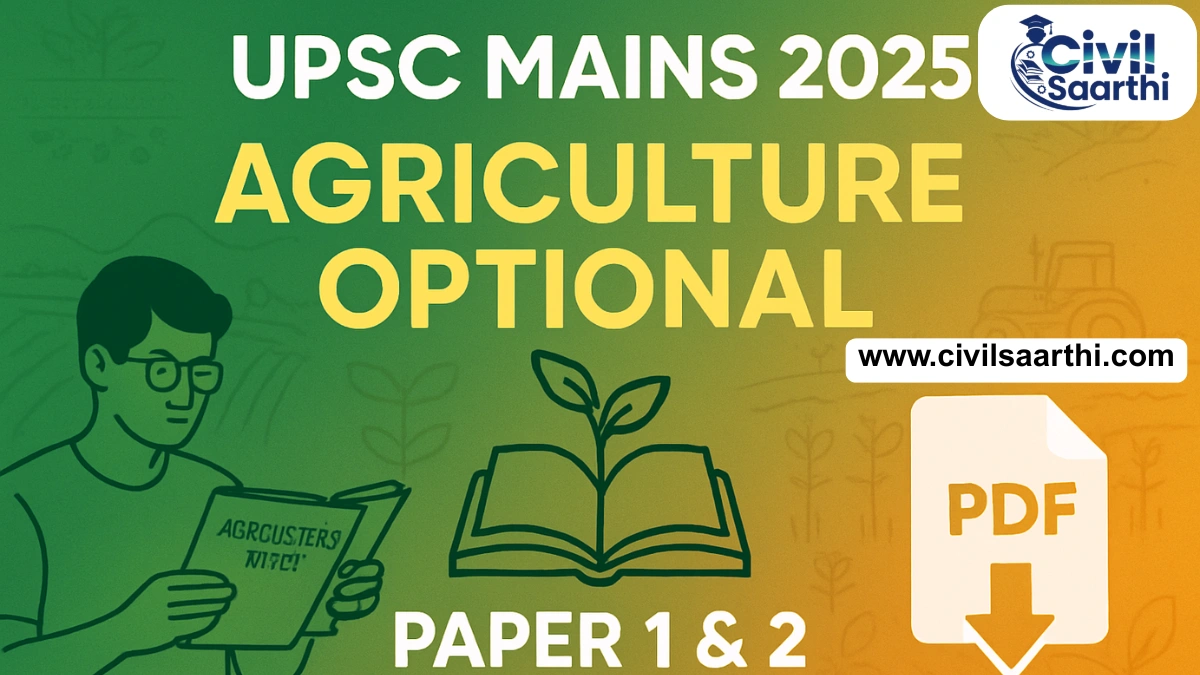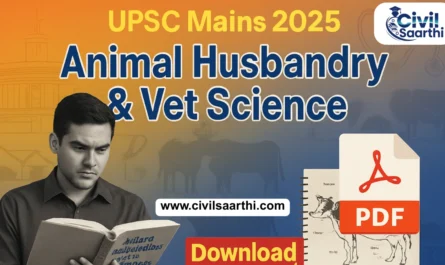The UPSC Agriculture Optional Paper 2025 is one of the most popular choices among aspirants with a background in agricultural sciences, botany, or environmental studies. This optional is considered highly scoring due to its scientific approach and direct relevance to India’s rural economy and food security. Candidates who prepare well can benefit from its overlap with General Studies Paper III and Essay writing.
UPSC Agriculture Optional Paper 2025 Overview
The UPSC Agriculture Optional Paper 2025 overview shows that it is a technical yet concise optional. Its syllabus covers agronomy, ecology, soil science, agricultural economics, and extension services. The subject is especially useful for candidates from ICAR and agricultural universities who can relate scientific knowledge to UPSC-style answers.
| Particulars | Details |
|---|---|
| Subject | Agriculture |
| Conducted by | Union Public Service Commission (UPSC) |
| Paper Type | Descriptive (Subjective) |
| Number of Papers | 2 (Paper I & Paper II) |
| Total Marks | 500 (250 marks each) |
| Overlap with GS | GS Paper III (Agriculture, Economy, Food Security, Environment) |
UPSC Agriculture Optional Paper 2025 Download PDF
The official UPSC Agriculture Optional Paper 2025 PDF download will be available after the Mains exam on the UPSC website. Candidates should download both Paper I and Paper II for practice. Solving these PDFs is crucial to understand the question pattern, frequently repeated topics, and the depth of answers expected by UPSC examiners.
UPSC Agriculture Optional Paper 1 2025 Download PDF
UPSC Agriculture Optional Paper 2 2025 Download PDF
Steps to Download UPSC Agriculture Optional Paper 2025
The steps to download UPSC Agriculture Optional Paper 2025 PDF are simple and can be done from the official UPSC website. Authentic PDFs help aspirants avoid unreliable sources and practice with genuine past year question papers.
Visit the official UPSC website at upsc.gov.in.
Click on the Examination tab on the homepage.
Select Previous Question Papers.
Choose Civil Services (Main) Examination.
Select Agriculture optional from the list.
Download the Paper I and Paper II PDFs.
UPSC Agriculture Optional Paper Exam Pattern 2025
The UPSC Agriculture Optional Paper Exam Pattern 2025 consists of two papers, each carrying 250 marks. Paper I deals with ecology, cropping systems, and soil science, while Paper II focuses on genetics, plant breeding, horticulture, and agricultural economics. Structured writing with diagrams can significantly boost marks.
| Paper | Coverage | Marks | Duration |
|---|---|---|---|
| Paper I | Ecology, Agronomy, Soil Science, Cropping Patterns, Agroforestry | 250 | 3 Hours |
| Paper II | Genetics, Plant Breeding, Horticulture, Agricultural Economics, Extension | 250 | 3 Hours |
| Total | – | 500 | – |
UPSC Agriculture Optional Syllabus 2025
The UPSC Agriculture Optional Syllabus 2025 is technical yet concise compared to humanities subjects. Paper I covers natural resources, soil management, cropping patterns, and agronomy. Paper II includes genetics, plant breeding, biotechnology, horticulture, agricultural economics, and farm management. Aspirants should prepare with ICAR notes and standard textbooks.
Paper I Syllabus
Ecology & its role in sustainable resource management.
Cropping patterns in India under different climatic zones.
Soil science, fertility, irrigation systems, and water-use efficiency.
Pest management, weed control, integrated farming systems.
Agroforestry, food production, and environmental sustainability.
Paper II Syllabus
Genetics, cell biology, and biotechnological applications in crops.
Plant breeding methods and crop improvement.
Horticulture, floriculture, and post-harvest management.
Agricultural economics, marketing, rural credit, and farm management.
Agricultural extension, communication, and seed technology.
For detailed Syllabus Read: UPSC Agriculture Optional Syllabus
UPSC Agriculture Optional Success Rate 2025
The UPSC Agriculture Optional Success Rate 2025 remains higher than many humanities optionals, especially for science graduates. Candidates with agricultural knowledge can apply practical examples in their answers, which increases their scoring potential.
| Year | Candidates Appeared | Recommended Candidates | Success Rate |
|---|---|---|---|
| 2020 | 1240 | 110 | 8.8% |
| 2021 | 1175 | 95 | 8.1% |
| 2022 | 1110 | 100 | 9.0% |
| 2023 | 1065 | 92 | 8.6% |
| 2024 | 1100+ | – | 8–9% |
The stable 8–9% success rate shows that Agriculture optional remains reliable for candidates with subject expertise.
Preparation Tips for UPSC Agriculture Optional Paper 2025
To score well in the UPSC Agriculture Optional Paper 2025, aspirants should focus on both content mastery and answer presentation. Using flowcharts, diagrams, and examples from government schemes makes answers stand out.
Build strong basics: Start with NCERTs and ICAR material for soil science and crop production.
Use standard books: Refer to Rangaswami’s Crop Production and B.D. Singh’s Plant Breeding.
Write with diagrams: Use neat illustrations of cycles, root structures, and cropping patterns.
Integrate current affairs: Mention schemes like PMFBY, PM-KISAN, and National Mission on Sustainable Agriculture.
Solve PYQs: Practice at least 10 years of UPSC Agriculture optional question papers with time management.
UPSC Agriculture Optional Paper 2025 FAQs
Q1. How many papers are there in UPSC Agriculture optional?
There are two papers: Paper I and Paper II, each of 250 marks, making a total of 500 marks.
Q2. Is Agriculture optional scoring in UPSC?
Yes, the UPSC Agriculture Optional Paper 2025 is considered scoring for candidates with subject knowledge, as scientific presentation fetches good marks.
Q3. Does Agriculture optional overlap with General Studies?
Yes, it overlaps heavily with GS Paper III in areas like agriculture, food security, economy, and environment.
Q4. What is the success rate of Agriculture optional?
The average success rate is around 8-9%, making it better than several other optionals.
Q5. Who should choose Agriculture optional in UPSC?
Candidates with an academic background in agriculture, botany, or life sciences should choose this subject for better scoring potential.







